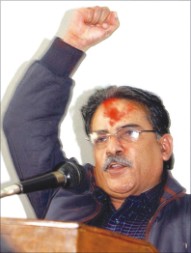|
International
A Fine Balance
Aditya Baral

People have friends but nations have interests' is a popular tenet in modern diplomacy. In the course of its transformation into New Nepal and coming up with a new constitution, the country will face immense hurdles - emanating both from within the country and outside. These hurdles will call for deft handling.
The issues cropping up from within are controllable to some extent, however, problems created by the outsiders are difficult to douse. The undesired influence of foreigners (chalkhel) prospers during the period of political and social turbulence--made even more complex by confusions about appropriate theoretical policy framework. Finding a political way out depends on individual wisdom, belief and interests. Likewise, theoretical interpretations also vary with situation and context.
Nepal has witnessed massive chalkhel from various quarters, primarily in the aftermath of democratic revolution of the 1990. It was good to get outside help of just about any kind to uproot the authoritarian royal regime and during the peaceful revolution of 2006. But solicitation of outside help to resolve domestic and local issues, a firmly rooted political legacy in Nepal, undermines the country's capacity to find solutions from within the Nepalis and challenges their competitiveness in the international arena. The country needs to chalk out urgent solutions to end this dependency syndrome and protect its national interests.
It is unjustifiable to accuse others of chalkhel in Nepali politics unless we first put our own house in order. This is not to demean the sincere help of our foreign friends directed towards the resolution of the protracted political logjam and constitution writing. And foreign assistance in our development endeavours should not be looked down upon. Nonetheless, we ought to demarcate between areas of genuine help and possible chalkhel.
The Nepalis need to keep in mind that all influential international actors wish to remain at the epicenter of the roiling political turmoil in Nepal and claim credit for any breakthrough in the lead up to the promulgation of the new constitution.
 |
| Prachanda, the President of Unified Communist Party of Nepal Maoist. |
There is a culture of accusing different power centres for any big event in Nepali politics - which includes the formation and dissolution of governments. People imbibe the rhetoric of regional and international powers 'remote controlling' our national politics, which is oftentimes hard to digest for a scribe like me. In times of crisis, human beings have a natural tendency of accusing one another for any wrongdoing. Maybe it is the result of our tendency to inflate even small problems into full - blown crisis that most of us are gripped by a sense of hypochondria, a reluctance to do the right thing at the right time if you like. Our poor international image hardly helps improve the level of confidence.
Moreover, the chronic shortage of confidence in our rulers and compulsions imposed by coalition politics have time and again prevented them from speaking on the basis of their conviction. Thus the foreign phobia can be seen as emanating from a chronic lack of confidence among our political leaders.
The political crisis is not going to conclude anytime soon and therein lies the added danger of foreign meddling. Even after we carve our provinces and get into the nuances of provincial politics under the banner of full-fledged republic, we will still encounter many problems. Immense local and ethnic issues would hover above our heads compelling us to camouflage our partisan interests. This will precipitate more turmoil and political disturbances during the course of hard negotiations between centre and states. Cognizant of this fact, many foreign agencies would start to spread their offices/representative across the country, which might give rise to the problem of political interference at the local level.
The million dollar question here is: How does a small natsion in protracted political turmoil look after its interests vis-à-vis foreigners?
Besides Nepalis are soft speakers, polite and always smiling in the presence of foreigners, the traits which have been leveraged to boost tourism in the country. The chakhel I talk about might not be apparent to the Nepali eyes used to treating foreigners as gods. Thus setting up a system where local disputes can be settled through institutional mechanisms rather than through individual initiatives would strengthen the culture of transparency and bolster nascent democracyas well as keep foreign meddling to a minimum.
Aditya Baral was foreign relations advisor of former prime minister Girija Prasad Koirala.
Copyright
(R) thedailystar.net 2010
|

